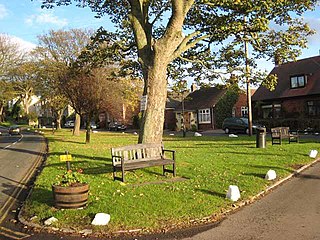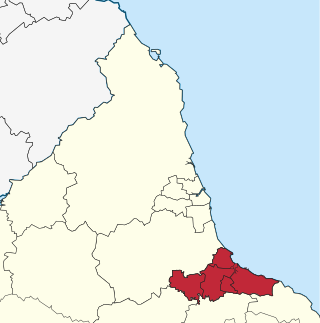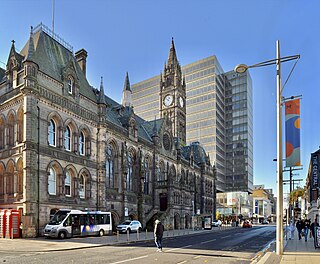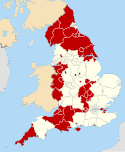
North Yorkshire is a ceremonial county in the Yorkshire and the Humber and North East regions of England. It borders County Durham to the north, the North Sea to the east, the East Riding of Yorkshire to the south-east, South Yorkshire to the south, West Yorkshire to the south-west, and Cumbria and Lancashire to the west. Northallerton is the county town.

Hartlepool is a seaside and port town in County Durham, England. It is governed by a unitary authority borough named after the town. The borough is part of the devolved Tees Valley area. With an estimated population of 87,995, it is the second-largest settlement in County Durham.

The Borough of Stockton-on-Tees is a unitary authority with borough status in the counties of County Durham and North Yorkshire, England. The borough had a population of 196,600 in 2021.

Tees Valley is a combined authority area in Northern England, around the lower River Tees. The area is not a geographical valley; the local term for the valley is Teesdale. The combined authority covers five council areas: Darlington, Hartlepool, Middlesbrough, Redcar and Cleveland and Stockton-on-Tees.

Dalton Piercy is a village and civil parish in the borough of Hartlepool, County Durham, in England. The population of the civil parish taken at the 2011 Cernsus was 289.

Hart is a village and civil parish in County Durham, England, northwest of Hartlepool.

Elwick is a village and civil parish in the borough of Hartlepool in County Durham, England. It is situated near the A19 road to the west of Hartlepool. Historically, Elwick was a township until 1866 when it became a civil parish.

The Borough of Darlington is a local government district with borough status in County Durham, England. Since 1997 Darlington Borough Council has been a unitary authority, with both district-level and county-level functions; it is independent from Durham County Council. It is named after its largest settlement, the town of Darlington, where the council is based. The borough also includes a rural area surrounding the town which contains several villages. The population of the borough at the 2021 census was 107,800, of which over 86% (93,015) lived in the built-up area of Darlington itself.
They had been successive district administration in the County of Durham. The ancient county was formerly structured around the Bishop of Durham with ancient wards and boroughs.

Middlesbrough Council, also known as Middlesbrough Borough Council, is the local authority for Middlesbrough, in the ceremonial county of North Yorkshire, England. Since 1996 it has been a unitary authority, providing both district-level and county-level services. The council is led by the directly elected Mayor of Middlesbrough.
Hartlepool Borough Council elections usually take place for a third of the council, three years out of every four. Hartlepool Borough Council is the local authority for the unitary authority of Hartlepool in County Durham, England. Until 1 April 1996 it was a non-metropolitan district in Cleveland.

Cleveland was a non-metropolitan county located in North East England which existed between 1974 and 1996. Cleveland was a two-tier county and had four boroughs: Hartlepool, Stockton-on-Tees, Middlesbrough and Langbaurgh-on-Tees. The county town was Middlesbrough, where Cleveland County Council met. The county was named after the historic area of Cleveland, Yorkshire. Its area is now split between the counties of North Yorkshire and County Durham.

Durham County Council is the local authority which governs the non-metropolitan county of County Durham in North East England. Since 2009 it has been a unitary authority, having taken over district-level functions when the county's districts were abolished. The non-metropolitan county is smaller than the ceremonial county of County Durham, which additionally includes Darlington, Hartlepool and the parts of Stockton-on-Tees north of the River Tees. The county council has its headquarters at County Hall in Durham.

Stockton-on-Tees Borough Council is the local authority of the Borough of Stockton-on-Tees, which straddles the ceremonial counties of County Durham and North Yorkshire in England. Since 1996 the council has been a unitary authority, providing both district-level and county-level services. It therefore provides services including Council Tax billing, libraries, social services, town planning, waste collection and disposal, and it is a local education authority. Since 2016 the council has been a member of the Tees Valley Combined Authority, which has been led by the directly elected Tees Valley Mayor since 2017.

Redcar and Cleveland Borough Council is the local authority for Redcar and Cleveland in the ceremonial county of North Yorkshire, England. Since 1996 it has been a unitary authority, having the powers of a non-metropolitan county and district council combined. The council was created in 1974 as Langbaurgh Borough Council and was a district-level authority until 1996 when it was renamed and became a unitary authority, taking over county-level functions from the abolished Cleveland County Council. The council is based at the Civic Centre in Redcar.

North Tyneside Council is the local authority for the metropolitan borough of North Tyneside in Tyne and Wear, England. It is one of five such councils in Tyne and Wear, and one of 36 in England. It provides the majority of local government services in North Tyneside.

The Tees Valley Combined Authority (TVCA) is the combined authority for the Tees Valley urban area in England consisting of the following five unitary authorities: Darlington, Hartlepool, Middlesbrough, Redcar and Cleveland, and Stockton-on-Tees, covering a population of approximately 700,000 people. It was proposed that a combined authority be established by statutory instrument under the Local Democracy, Economic Development and Construction Act 2009. It is a strategic authority with powers over transport, economic development and regeneration including the flagship Teesside Freeport.

The inaugural Tees Valley mayoral election was held on 4 May 2017 to elect the mayor of the Tees Valley Combined Authority. The mayor was elected by the supplementary vote system. Subsequent elections will be held in May 2021 and every four years after 2024.

The Borough of Middlesbrough is a borough with unitary authority status in North Yorkshire, England, based around the town of Middlesbrough in the north of the county. It is part of the Tees Valley combined authority, along with Stockton-on-Tees, Redcar and Cleveland, Hartlepool and Darlington boroughs. Nunthorpe along with Stainton and Thornton have statutory parish councils.
The 2024 Hartlepool Borough Council election was held on Thursday 2 May 2024, alongside the other local elections in the United Kingdom being held on the same day. One-third of the 36 members of Hartlepool Borough Council in County Durham were elected.





























